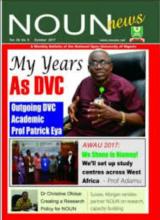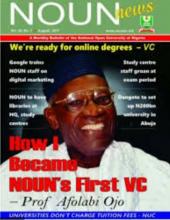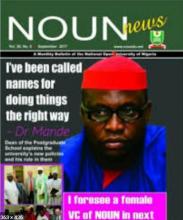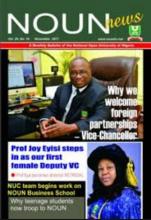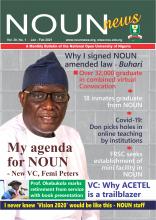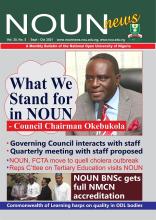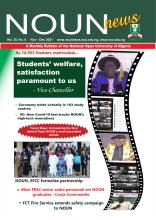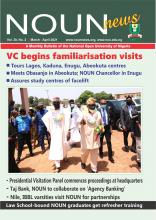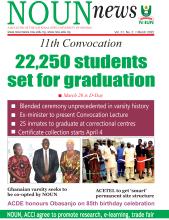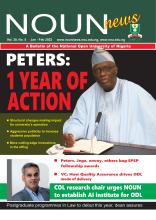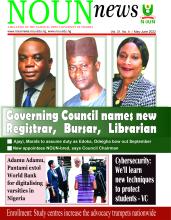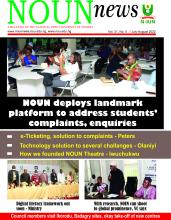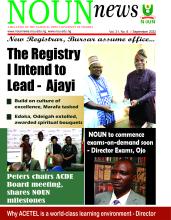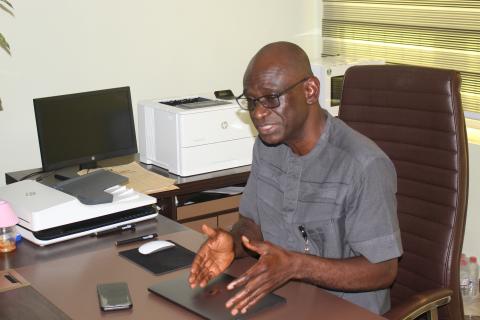
With numerous ambitious, bold, and ground-breaking plans for NOUN, Prof. Godwin Akper, recently appointed as the new DVC, TIR, is certainly well-prepared for the position. In this interview with NOUN News correspondents Debbie Nduba & Ibrahim Kabiru Sule, the new DVC, whose journey in the university spans critical offices, discussed his intention to start enrolling international students at NOUN by the beginning of the next semester in January, along with many other commendable ideas to transform NOUN into a true 21st-century university.
Briefly, who is Prof. Gowin Akper?
Okay, I was born on July 19th, 1969, to be specific. My father, Evangelist Daniel Iorihi Akper, was a disciplinarian and a Bible School teacher under the Dutch Reformed Church Mission. I was raised in a missionary quarter initially, and perhaps this upbringing had some influence on me, whether positively or negatively. That's why I value discipline greatly because, for the better part of my life, discipline was considered the best approach to establishing what I would call a 'community of life.' This refers to a community that fosters faithful living beneficial to both family and society at large.
From that background, I view work as a calling; it's something one must do to fulfill a specific goal. If assigned a task, it means that God, through one's organization, has requested the performance of that duty. Success or failure depends on personal conviction. Did one give the best effort, or not? Or perhaps the individual didn't see it as a calling, viewing it merely as an opportunity to profit him/herself without concern as to whether the society benefits from the service or not. These are the issues I consider critical in public service.
Regarding my education, during my formative years, I attended mostly private schools. In 1982, I enrolled in St. Mulumba’s College, Jos (a Catholic School). I later transferred in 1985, at my father's request, to King’s Comprehensive College, a privately owned Christian Mission School. I completed my secondary school education in 1989. Due to the change in schools, I lost two years as the curriculum at King’s Comprehensive college was more commercially oriented compared to the purely science-based curriculum at St. Mulumba’s College. This extended my time in secondary school.
Subsequently, I attended Benue Polytechnic, Ugbokolo, from 1990 to 1991. Later, from 1991 to 1995, I pursued studies at Reformed Theological College of Nigeria (now Reformed Theological Seminary), Mkar. After completing my seminary training, the missionary organization sent me to the United States. I attended Westminster in California, where I pursued a Master of Arts in Religion, from 1996 to 1999.
Following my Master of Arts in Religion, I furthered my studies at the University of Stellenbosch in South Africa, specializing in Church History and Policy and Systematic Theology, respectively, from 2000 to 2004 leading to M.Th and D.Th. Finally, I pursued a PGDDE at the National Open University of Nigeria (NOUN).
As the recently appointed DVC, TIR, what can the NOUN community expect from you?
In my role as DVC, TIR, I believe addressing the existing gaps in ODL standards and requirements is crucial, particularly in terms of internet accessibility. We aim to provide free WIFI for all staff and students, ensuring at least 8 hours of access per day. This initiative will be visible as you approach our campuses; the recent assessors for three of our programmes emphasized the significance of this provision. During their recent visit to the NOUN, they immediately accessed our WIFI and were impressed by its functionality. I spent the weekend working with a team to ensure its effectiveness, and I can confirm that it's operational now.
Another vital aspect is improving our study centres. Given that our educational delivery occurs predominantly in these centres, I've held discussions with the VC and we have taken steps to ensure that by May of next year, all our main study centres will be equipped with these facilities, not just limited to the headquarters.
Furthermore, I am keen on addressing the admission of foreign students. Having served on the International Advisory Board of a university, I gained valuable insights into accommodating international students from diverse regions like Asia, Africa, and the Middle East. This experience informs my current suggestion: allowing access to NOUN for international students globally. Presently, registration is restricted to learners in Nigerians, which contradicts the fundamental principles of Open and Distance Learning (ODL). Hence, this is a top priority for me.
The provision of internet across our campuses is the primary focus, given my background in DAP, I understanding ODL requirements. The accessibility of WIFI should be evident as one approaches an ODL institution's campus.
I strongly advocate for enabling students to study from anywhere, be it within the confines of our facilities or remotely from their homes. This opportunity should be extended to the global academic community. However, achieving this entails technological advancements and addressing national policies like the Treasury Single Account, among others. Collaborative efforts with the Registrar and VC have been fruitful, but we await action from the Office of the Accountant General to establish a platform for students to pay in their local currencies. Our Management Information Systems (MIS) team has been working on this and has developed a link for foreign students to use. They can select their country while applying, designating it as their study centre. We are in the final stage of this process.
Once these initiatives are accomplished, the subsequent focus will be implementing the Vice-Chancellor's policy of providing tablets to all staff for more productivity. I firmly believe our university staff possess the necessary IT capabilities, and I speak from experience when I say that there's nothing IT-related that our staff cannot handle.
For the International students, do you have a time line for their enrolment?
Yes, we have a specific timeline for the enrolment of international students. It's imperative that we act swiftly. In today's educational landscape, there's no room for complacency. We are well aware of the competition we face in the market. While some may take time to catch up with our standards, I've observed other universities imitating certain aspects of our institution, including our logo and motto, albeit with minor variations. This underscores the need for our vigilance; it's the nature of 21st-century university education. Comfort breeds complacency, and that's a problem.
Consider the University of Cape Town, often ranked among the top universities in Africa. Despite their high standing, if you were to speak with their VC, he would likely express concerns about maintaining their ranking - that's the essence of competition. The moment we start assuming that we've reached the pinnacle of success, we risk stagnation. In social dynamics, the minute you feel too comfortable, you start a downward spiral. However, by continually seeking improvement, we stand a better chance of staying ahead and being competitive.
Our goal is to finalize this process by the end of December. Given that the next session commences in January, our aim is to have international students enrolled by then. I'm targeting between 10% to 19% of our enrollment next year should comprise international students. Achieving this will mark significant progress for us. Moreover, I firmly believe that our in-house technical team possesses the capability to provide all necessary IT solutions, barring scenarios where a solution doesn't exist.
Research constitutes a significant part of your core responsibilities. As DVC TIR, how do you plan to promote research, and which areas are you focusing on to greatly benefit the institution?
Certainly, there are two aspects to consider here. Firstly, non-teaching staff within our university often hold the misconception that research is solely for the academia, which is erroneous. I believe this is an area I need to address through discussions with the Registrar. We've been engaged in ongoing discussions and plan to further explore how non-teaching staff can actively participate in research endeavours. For instance, media outlets engage in investigative journalism, which essentially involves research. If funds were allocated for media organizations to conduct research, wouldn't that contribute positively to ODL development? Rather than solely portraying positive images of ourselves, the media could delve deeper into factual investigations. For example, how does media impact Open and Distance Learning (ODL)? This, in essence, is a critical aspect of our delivery methods, utilizing platforms like NOUN FM to disseminate information about new discoveries and updates. How can the media incorporate all facets of the university to fulfill this role and further promote learning through their platforms?
Imagine if the media were commissioned for a 3-month research project with funding; successful outcomes would be lauded, whereas failure to deliver would require accountability. In line with my training and philosophy, when assigning a task, the first consideration should be providing the necessary tools for effective execution. Without the tools, holding someone accountable for task completion becomes unjustifiable. While this might not be the ultimate approach, achieving optimal results demands such a methodology. Fortunately, the VC shares similar sentiments regarding this matter. All senior staff members should be engaged in research endeavours, fostering a democratization of research, recognizing that nobody is inherently an ODL staff member, but rather it's a matter of interest and commitment.
In the transformation of the Nigerian university system from academic and non-academic distinctions to teaching and non-teaching roles, the underlying concept remains that everyone contributes academically by conducting research and potentially going on sabbaticals to enhance learning and research capabilities.
During my tenure in DEA, implementing virtual promotional examinations faced opposition, yet it was a directive to provide the platform for such exams. Those who participated then now possess an advantage over those engaging in it presently. Each directorate within NOUN should be accountable and showcase their research output; our research endeavours shouldn't be limited to academic departments alone. We must delve deeper to identify what's truly essential for an ODL institution—discovering new trends, methods, and enhanced approaches to delivering university education.
Once research becomes ingrained as a cultural norm within our university, gossips will dissipate. There's a prevailing belief among our students that learning through gossip is effective, but a culture of research will nullify this belief. When we are actively engaged in meaningful work, gossip becomes irrelevant. I consider these responsibilities not just as tasks but as burdens, burdens that I carry.
You have held significant positions in NOUN that involved student matters, including roles as the Dean, Faculty of Arts, Director of DEA, Director of DAP, and currently as the DVC, TIR. To sum up, how would you assess our performance concerning issues like missing results, examination malpractice, and students’ registration?
Well I avoid delving into Prof. Mafiana's area of operation, I can only share my experiences from my time in DEA. Addressing the issue of missing results from e-exams was a priority. I conducted research to identify the root causes. It became evident that some candidates would complete their exams but fail to submit them. To resolve this, I instructed our technical team to configure the system to automatically submit scores if candidates left without doing so. Additionally, in cases of power failure causing multiple scores, we merged these scores to ensure fairness. This step significantly reduced missing e-exams.
Another concern was related to our technical team ending sessions without submitting results. To rectify this, I implemented server lock measures and entrusted the password to the super user. This way, upon completing exams, the server had to be brought back by the team, allowing us to review and address any anomalies immediately. This proactive approach led to a significant reduction in missing e-exams.
Regarding the Pen-on-Paper (POP) exams, I observed cases where candidates attempted exams in multiple study centres within a short timeframe, which raised concerns about integrity. To address this, I explored strategies employed by other open universities. For instance, Indira Gandhi National Open University used a camera-based system, ensuring candidates sat in assigned positions. Similarly, The Open University of Tanzania had pre-accredited supervisors and invigilators for exams taken outside Tanzania. Implementing measures like these helped maintain the integrity of exams.
During my tenure in DAP, at the time I took over as Director DAP, only 52% of our programs had achieved full accreditation status, while the remaining 48% held interim accreditation status. However, upon my departure, we've substantially improved, now holding an impressive 98% full accreditation status, with only 2% remaining in interim status. This accomplishment stands out significantly, signifying exceptional performance and distinction. While we have made remarkable progress, there's always space for enhancement to maintain and surpass this level of excellence.
From our collected opinions, everyone who has worked with you in various offices attests that you are upright, result-oriented, and overall, a good individual. What's the secret behind this?
I mentioned from the outset that I was raised by a disciplinarian—a very strict person who believed in doing things right. My father never settled for good; his standard was excellence. If something wasn't excellent, it meant there was more work to be done. This attitude has its implications; it can leave some people behind, particularly those who are slow.
In Open and Distance Learning (ODL), it's a challenge to embody everyone, but I believe that to succeed in delivering at NOUN, you must see your job as a calling. Once you start thinking that the VC, Registrar, or Bursar owes you something for your work, you've lost sight of the essence. In teaching and learning, you must be willing to make sacrifices. We take students’ scripts home; we mark them overnight. We should recognize that we're called to this job, and even if the system doesn't reward us, God will reward us in some way. My experience has shown me the rewarding nature of honesty at your duty post. People might say negative things about you, yet when they need effective delivery, they'll seek you out. It's better to be perceived that way than to be hailed without substance during actual delivery.
In essence, let us view work as a calling. None of us here in the university claims to be irreligious; we are either Muslims or Christians. Fortunately, I have some knowledge of the value systems these two religions promote. If one practices good ethics as a Muslim or Christian, Nigeria will benefit from it. If you don't use your religion to improve NOUN, there lies a problem. This university has a great system. The real issue is whether the stakeholders within the system truly understand their calling within NOUN or not.
Regarding positions, I don’t seek them out because I comprehend the responsibilities they entail. It's not about pride but knowing it's a task and a calling—not about what you'll gain but what you'll contribute to benefit everyone and enhance the system. Focus on what you can do for NOUN rather than what NOUN can do for you, and change will occur. Our contributions to service matter the most.
In the next two years, where do you envision NOUN's position concerning technology and research?
I've mentioned previously that our technical team is excellent, and I have confidence in their capabilities. When it comes to research potential, we have over 5,000 staff members, all of whom are scholars. That's the reality. If all of them engage in research endeavours, our output in research will undoubtedly be significant.
Regarding Open and Distance Learning (ODL), if we adhere to two fundamental principles: firstly, perceiving this role as a calling—a responsibility we've been summoned to fulfill, demanding our faithfulness. Secondly, while answering this call, we question ourselves: 'What do I contribute to this delivery process?' If we introspect and consistently apply these principles, I believe that in the next two years, NOUN will gain greater recognition not only within Nigeria but internationally as well. I firmly believe that the most effective advocacy doesn't come from wearing promotional T-shirts; instead, it emerges from the quality of our educational delivery.
On a lighter mood, how does the man Godwin relax outside the confines of his office?
I play golf. It's a game that demands such focused attention that if your mind wanders elsewhere, your performance suffers. Golf requires a hundred percent concentration, with no distractions while playing. Your mind must be entirely free; otherwise, your game will be affected. It's a game with a design akin to military precision and can be expensive due to the necessary equipment.
- Log in to post comments
- 145 views

